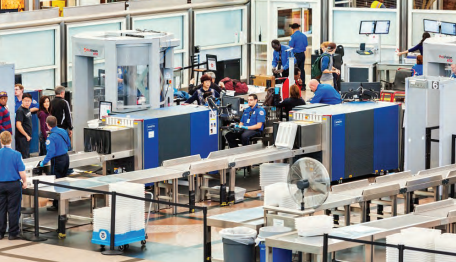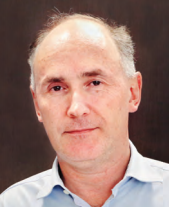Jerome de Chassey
Biz@India
June 2017
Smiths Detection products are present everywhere in India, especially our X-ray scanners are likely to have been used by a number of people at some point or the other, however, we are looking to solidify and expand our operations in India, says Chassey.
Operating in India for more than 15 years now, Smiths Detection, world’s leading experts in safeguarding society, military and borders, is present at all the 125 airports in the country. Jerome de Chassey, general manager, Smiths Detection Veecon Systems, talks to Biz@India about his ambition to expand further and aiming at India to be amongst the top countries worldwide for Smiths group.
Can you briefly give us an overview of your presence in India and also around the world?
Smiths Detection is a group based in London. We are a global leader in X-ray scanners and protection of individuals from threats. We also have a detection business against chemical threats, which is used by armies across the world. In India, we are the market leader in the aviation sector. You can spot our scanners in almost all airports across the country and we also sell protection equipment to other sectors. For instance, when you go to a hotel and put your luggage in a scanning machine – it’s usually a Smiths equipment. We also sell these kinds of equipment to large corporates and companies like Infosys and Tata. Smiths Detection in India has been operating for more than 15 years now. The Smiths Group has three primary businesses in the country.
Smiths Detection based in the Indian capital New Delhi revolves around protections products, Smiths Medical based in Mumbai (in the western state of Maharashtra) is focused on making and selling medical devices and John Crane based in Bengaluru (in the southern state of Karnataka), is focused on all of India’s business.
Safety and security remain one of the biggest issues for the transport industry in India and also around the world. How are you keeping up with new risks and dangers? What are the new technologies/solutions developed?
The main product we sell to airports today is the check point solution, which helps airport operators to ensure that the baggage that you check in to the airplane or the hand luggage you take along, are safe. We are currently using X-ray as the main technology. What we have done over the years is to refine our analysis – the software we use is to recreate better images so that the person who views those images can make right decisions. In India, the primary people who use our equipment are Central Industrial Security Force (CISF) and the border patrols you see across airports.
Who are your principal customers in the Indian market?
Customers are broadly in four segments. We work with airports, airport operators, GMR Group, GVK, Airports Authority of India (AAI) and Cochin International Airport Limited (CIAL). Apart from airports we also work with airlines and cargo companies and not only sell products but also provide maintenance.
We also have a strong presence in urban security sector, primarily hotels. All the big brands like Taj and Oberoi, IT service companies, banks, and many private and corporate entities, tend to use Smiths machines. We also target ports and borders and recently commissioned for different sites that scan containers, which come on ships, based in Mumbai, Chennai and Tuticorin in the southern state of Tamil Nadu, and Kandla in the western state of Gujarat. The containers get loaded on the truck and we scan those trucks. The equipment used is very large and can scan 20 trucks per hour. I think last year, we scanned 25,000 containers.
We also have a strong presence in military sector – Indian Army and Indian Navy, primarily to provide them with equipment, which protects their crew from chemical solutions. For example, there is equipment that scans the atmosphere and gives an alarm when there is a potential threat in the air so that they can protect themselves. We provide the army with protecting devices for soldiers, which help them identify chemical threats and protect themselves quickly.
Who do you compete against and what are your main strengths vis-à-vis the competition and what are the challenges you face?
Main competitors are primarily the United States of America (US) based companies like Astrophysics, etc. We have also started to see some Chinese equipment vendors although they tend to focus on the low-end side of the market and sell very cheap low technology products. The main differentiation for Smiths is that our products are high-end technically with best definition scanning technologies and our brand name is also very strong. What differentiates us in India is that we have been established for many years now and have a strong focus on service. A lot of efforts are put to make sure that the services we provide to our customers are of top quality. It’s a part of the culture we have.
You recently completed the acquisition of Morpho Detection. How will this benefit you in the Indian market?
Are you scouting for more acquisitions? Morpho Detection is a big strategic move for Smiths. One of the big trends, especially at airports, is that the scanning technology is moving from X-ray to CT scans, which helps make 3D images, while X-ray is primarily 2D images. CT will probably become the norm in the next couple of years across airports and various other sectors, and Morpho has a very strong product in that particular segment. We do have a product that we make in Germany but Morpho has been focusing on that space for many more years now, so they have very good product suite. This can really help us in India because when I see the demands from airports going forward, a lot of it will be the CT based technology scanning equipment. So it is a strong value addition for us.

Smiths Detection has an installation base of more than 5,000 equipments in India, headquartered in Gurugram
What is Smiths Detections’ present focus area and goals for 2017-18?
The main goal for us in India is to grow. There are plenty of opportunities so the real focus for me is to ensure that we grab on as much growth as possible. The competition is very intense so it’s not an easy walk; we have to ensure that we stay close to our customers, engage with them and walk with them along the journey so that they value our differentiation. Hopefully, India will be one of the top countries worldwide for Smiths group.
Are you also providing some training or courses for your employees to keep them updated with the latest developments and technologies?
All employees and the team get training on a regular basis. We have copy-to-base training, which people do on quarterly basis. Some trainings are more compliant; we provide product knowledge and there are webinars every week. For personal development also we conduct regular trainings and host a lot of off-sites with the team as it is important for them to improve and work better together.
As you expand your activities, what is the skill gap and how are you addressing it?
In this industry, things evolve over time so we have to keep bringing new talent and that’s what we do. This is an equipment-based industry, which tends to move from selling products to selling solutions, that’s what we see as a trend. Selling solutions is a different dialogue; we have to meet customers, talk about their business in their words and translate their business needs into a particular solution. This is an evolution we will see in the next couple of years; the way we sell will probably evolve and therefore the skills required will evolve accordingly. The second aspect is that we sell software, so we also need to improve our understanding of how digital can impact the way we run business and probably we will have some skill gap then and will have to think about employing new people and bringing new talents.










